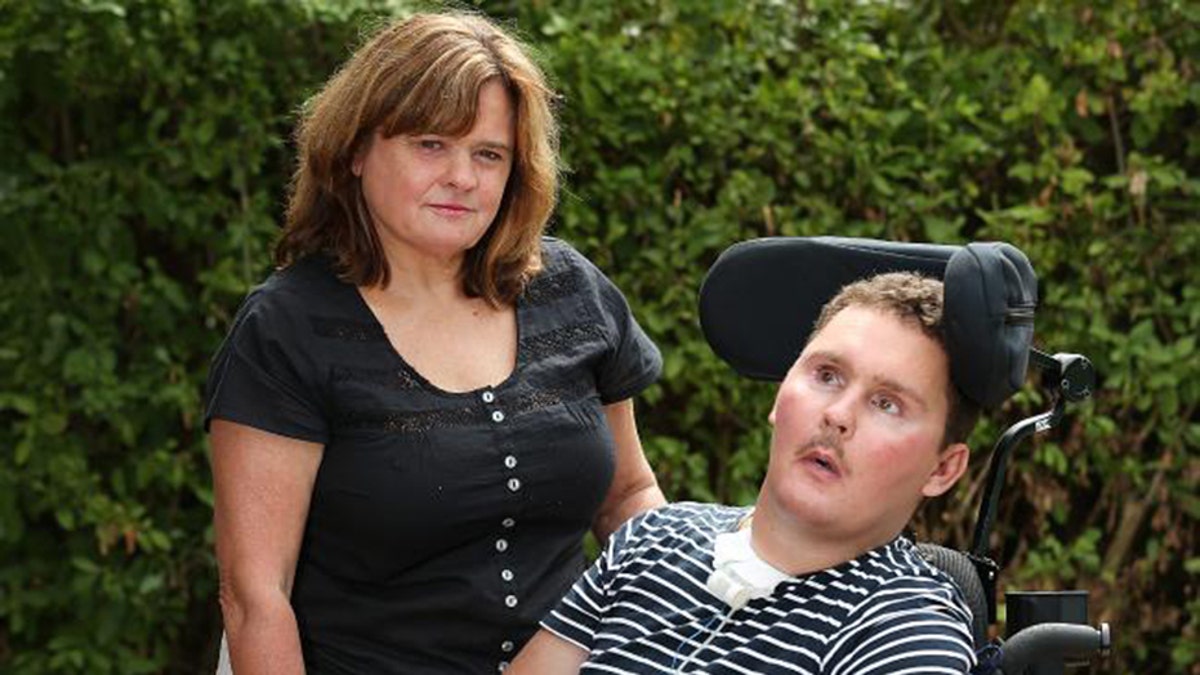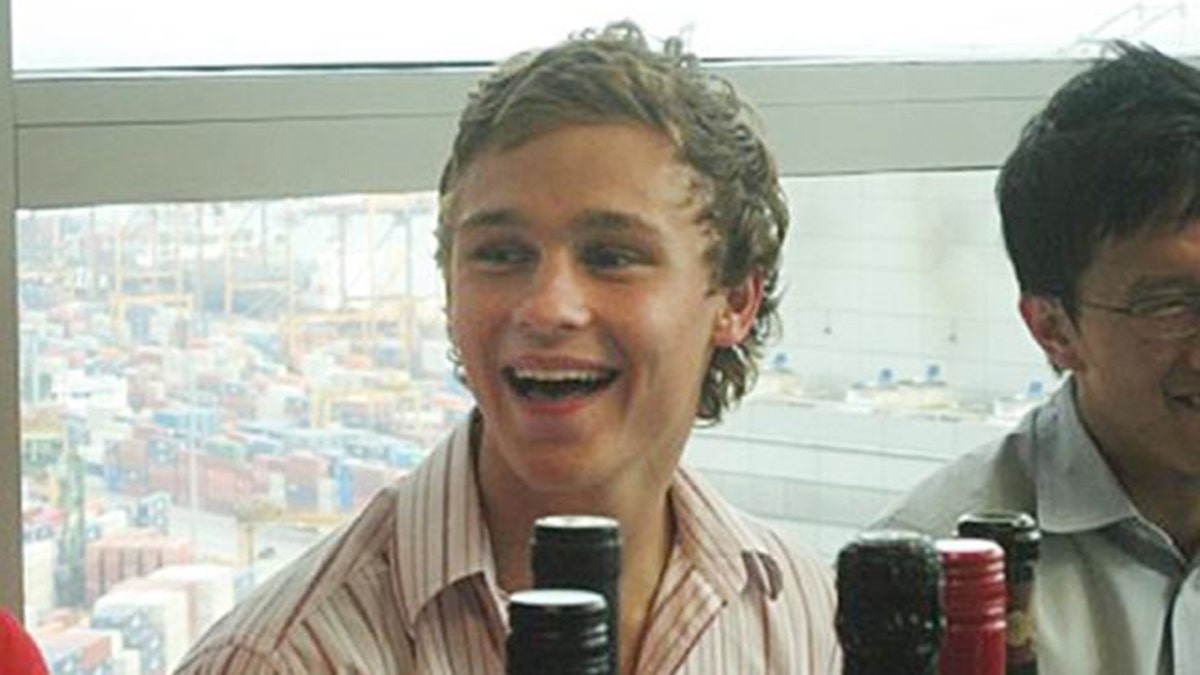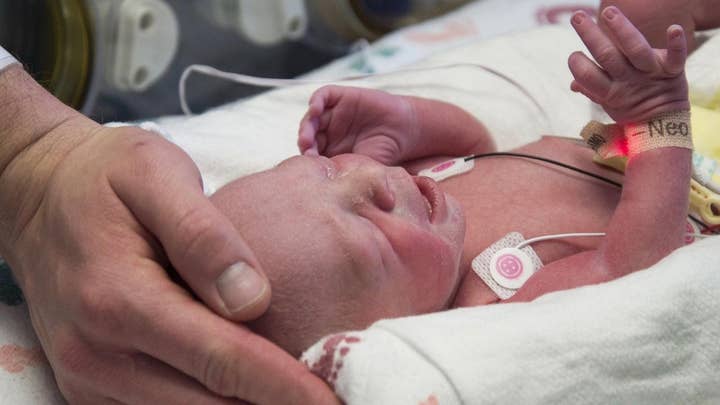
Sam Ballard (right) now needs 24/7 care from his mother Katie (left) and family after swallowing a garden slug as a dare and developing eosinophilic meningoencephalitis. They are in debt after the Australian government slashed funding. (News Corp Australia)
Sam Ballard, who has been profoundly disabled since swallowing a garden slug at a party as a dare at 19, has an amazing support group of family and friends in Australia.
Sam became a quadriplegic and has to be tube-fed after contracting rat lungworm from the backyard slug in 2010.
On Sunday evening, his friends Jimmy Galvin and Michael Sheasby appeared on Sunday Project alongside Sam's mom, Katie, to discuss how the 28-year-old’s life changed after that night.
“We were sitting over here, having a bit of a red wine appreciation night, trying to act as grown-ups, and a slug came crawling across here.
“The conversation came up, 'Should I eat it?' Off Sam went. Bang. That’s how it happened,” Galvin said.
As previously reported by news.com.au, Sam was a strapping, fun-loving rugby player when he went to a friend’s party eight years ago.
Prior to this, Ballard’s mother had thought of her son as a “larrikin” but “invincible”, that nothing could ever happen to him.
She described him as “my rough-and-tumble Sam.”
At Barker College, in Sydney’s northern suburbs, where he went to school, fellow students thought of Sam as a beautiful, outgoing kid, sporty, a star of drama, kind and that the girls loved him.
But the teenager’s life was to take a devastating turn.
Sam, from Sydney’s north shore, fell ill from the slug dare and was taken to Royal North Shore Hospital, where he was diagnosed as having been infected with rat lungworm.
The worm is found in rodents, but snails or slugs can become infected when they eat the feces of rats that carry the parasite, known as Angiostrongylus cantonensis.
While most people develop no symptoms, very rarely it causes an infection of the brain.
Sam contracted eosinophilic meningo-encephalitis, from which many people recover — and, initially at least, Sam seemed to be rallying.
But then he lapsed into a coma for 420 days and became a quadriplegic.
“Just take care of your mates," Galvin said. "Before you jump off a roof into pool or daring your mate to eat something stupid. It can have the worse consequences not only on your mate and the rest of your friends, the rest of your life, just take care of each other,” he said.
But the Sam of old is still there, his friends say.
“Seeing where he is now, being able to move his arms or just grip something, that to me is a huge improvement," said another mate, Michael Sheasby. "The walking into the room and a hands coming out to give you a handshake. It’s that kind of stuff.”
Jimmy Galvin said, “We like to sit down and watch the footy and watch the rugby. I try and make it matey and fun - we will crack a beer, when Katie goes out of the room, he reaches for it, he gets his lips out and sometimes we put a little bit of beer on his lips.”

Sam Ballard was a strapping rugby player before the devastating effects of the infection from a garden slug.
Interviewer Lisa Wilkinson asked, “Can you still see your mate Sam in there?”
“His eyes light up,” Galvin said.
“They go bang when you walk into the room. I apologized to Sam about everything that happened that night in the backyard. He just started crying his eyes out.”
“Team Ballard” raised money for the 24/7 care that the young man would require, but it could never be enough.
Now aged 28, Sam suffers seizures and cannot control his body temperature, the Daily Telegraph reported. He has to be tube-fed.
Katie Ballard applied to the National Disability Insurance Scheme (NDIS) when Sam became eligible for a $492,000 package in 2016.
But last September without warning, the NDIS texted Ballard to say a review of his plan had slashed his allocation to around $135,000.
The massive funding cut was without explanation and around-the-clock care means the Ballard family are heavily in debt.
They owe a nursing service $42,000.
The NDIS told The Daily Telegraph it had been “working closely with the Ballard family” to find a resolution and increase Sam’s support package.
A spokesperson for the National Disability Insurance Agency confirmed Sam’s plan had been adjusted back to the original level of funding, blaming the reduction by more than two-thirds was the result of an error not a policy change, The Project was told.

